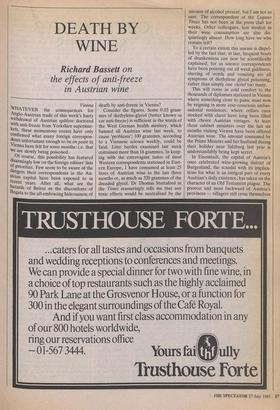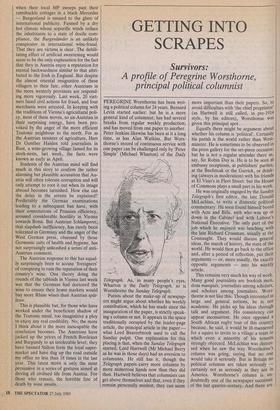DEATH BY WINE
Richard Bassett on
the effects of anti-freeze in Austrian wine
Vienna WHATEVER the consequences for Anglo-Austrian trade of this week's hasty Withdrawal of Austrian sptitlese doctored With anti-freeze from Yorkshire supermar- kets, these momentous events have only confirmed what many foreign correspon- dents unfortunate enough to be en poste in Vienna have felt for some months: i.e. that we are slowly being poisoned. Of course, this possibility has featured disarmingly low on the foreign editors' lists of priorities. Few seem to be aware of the dangers their correspondents in the Au- strian capital have been exposed to in recent years. After all, what are the hazards of Beirut or the discomforts of Bogata to the all-embracing hideousness of death by anti-freeze in Vienna? Consider the figures. Some 0.03 gram- mes of diethylene-glycol (better known as car anti-freeze) is sufficient in the words of the West German health ministry, which banned all Austrian wine last week, to cause 'problems'; 100 grammes, according to a Viennese science weekly, could be fatal. Litre bottles examined last week contained more than 16 grammes. In keep- ing with the extravagant tastes of most Western correspondents stationed in East- ern Europe, I have consumed at least 25 litres of Austrian wine in the last three months or, as much as 320 grammes of the dreaded glycol. Dr Thomas Stuttaford in the Times reassuringly tells me that any toxic effects would be neutralised by the amount of alcohol present, but I am not so sure. The correspondent of the Lugano Times has not been in the press club for weeks. Other colleagues, less modest in their wine consumption are also dis- quietingly absent. How long have we who remain left?
To a certain extent this unease is dispel- led by the fact that, at last, frequent bouts of drunkenness can now be scientifically explained; for as science correspondents have been pointing out all week giddiness, slurring of words and vomiting are all symptoms of diethylene glycol poisoning, rather than simply one viertel too many.
This will come as cold comfort to the thousands of diplomats stationed in Vienna where something close to panic must now be reigning in more cost-conscious ambas- sadorial residences, where cellars once stocked with claret have long been filled with choice Austrian vintages. At least three cabinet ministers over the last six months visiting Vienna have been offered Austrian wine. The amount consumed by the Prime Minister and her husband during their holiday near Salzburg last year is understandably being kept secret.
In Eisenstadt, the capital of Austria's once celebrated wine-growing district of Burgenland, the scandal with its implica- tions for what is an integral part of every Austrian's daily existence, has taken on the character of an Old Testament plague. The poorest and most backward of Austria's provinces — villagers still cross themselves when their local MP sweeps past their ramshackle cottages in a black Mercedes — Burgenland is unused to the glare of international publicity. Fanned by a dry hot climate whose soporific winds reduce the inhabitants to a state of docile com- pliance. the Burgenlander is an unlikely conspirator in international wine-fraud. That they are victims is clear. The debili- tating effect of artificial sweetening would seem to be the only explanation for the fact that they in Austria enjoy a reputation for mental backwardness similar to that attri- buted to the Irish in England. But despite the almost oriental resignation of these villagers to their fate, other Austrians in the more westerly provinces are respond- ing more vigorously. Last week, 20 vint- ners faced civil actions for fraud, and four merchants were arrested. In keeping with the traditions of Vienna's agricultural poli- cy, most of these moves, so un-Austrian in their surprising energy, have been pro- voked by the anger of the more efficient Teutonic neighbour to the north. For as the Austrian minister of agriculture, Herr Dr Gunther Haiden told journalists in Rust, a wine-growing village famed for its stork-nests, last week, the facts were known as early as April.
Students of the Austrian mind will find much in this story to confirm the rather alarming but plausible accusation that Au- stria will often tolerate corruption and will only attempt to root it out when its image abroad becomes tarnished. How else can the delay in the arrests be explained? Predictably the German examinations leading to a subsequent ban have, with their connotations of Prussian efficiency, aroused considerable hostility in Vienna towards Bonn. But Austrian Schlamperei, that slapdash inefficiency, has rarely been tolerated in Germany and the anger of the West German press, obsessed by those Germanic cults of health and hygiene, has not surprisingly unleashed a series of anti- Austrian comment.
The Austrian response to this has equal- ly surprisingly been to accuse 'foreigners' of conspiring to ruin the reputation of their country's wine. One theory doing the rounds of the tabloids in Vienna last week was that the Germans had doctored the wine to ensure their home markets would buy more Rhine wines than Austrian spilt- leses.
This is plausible but, for those who have worked under the beneficient shadow of the Teutonic mind, too imaginitive a ploy to enjoy any real credibility. No; the more I think about it the more inescapable the conclusion becomes. The Austrians have jacked up the prices of French Bordeaux and Burgundy to an intolerable level; they have banned Stilton form the local super- market and have dug up the road outside my office no less than 18 times in the last year. This latest move is only the most persuasive in a series of gestures aimed at driving all civilised life from Austria. For those who remain, the horrible fate of death by wine awaits.















































 Previous page
Previous page